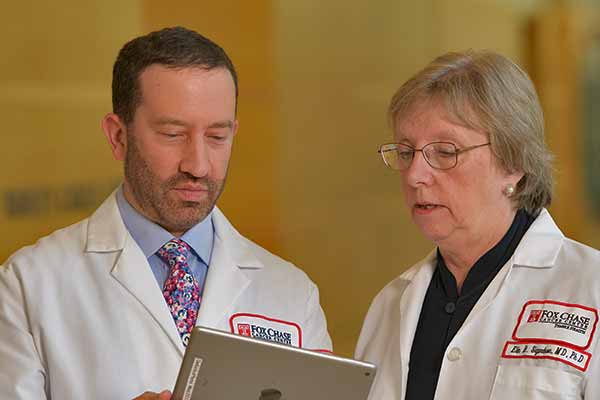PHILADELPHIA (October 21, 2019) – New research from Fox Chase Cancer Center has found that longer delays to surgery in women with ductal carcinoma in situ (DCIS) predicted a higher risk of invasive ductal carcinoma and a slightly worse survival rate.
“The survival difference with a delay is small,” said Richard J. Bleicher, MD, FACS, professor in the Department of Surgical Oncology at Fox Chase and a member of the Molecular Therapeutics Program. “While it’s not an emergency to get treated immediately, delays do have an effect and long delays should be avoided.”
DCIS occurs when abnormal cells form in the milk duct of the breast and is the earliest stage of breast cancer. If cancerous cells spread beyond the milk duct, the diagnosis advances to invasive ductal carcinoma.
The standard treatment for DCIS is surgery and radiotherapy, along with endocrine therapy, a tablet women take daily. But there is data to suggest that some DCIS may never progress to invasive disease, and clinical trials are now underway to determine whether DCIS can be observed, rather than removed by surgery.
“This large-scale dataset suggests that delays in operative management of DCIS are associated with invasion and slightly worse short-term outcomes. Since observation represents infinite delay, it suggests that observation should not yet be pursued outside of a clinical trial in patients who will tolerate excision,” Bleicher said.
“At minimum, these findings also suggest the need for long-term follow-up in women who are observed and better prediction of which subset of DCIS will develop an invasive component,” the authors wrote.

The researchers designed a population-based study of 140,615 women (123,947 with DCIS, 16,668 with invasive ductal carcinoma) using prospectively collected data from the National Cancer Database. The women were diagnosed with DCIS between 2004 and 2014. The researchers assessed overall survival using five time intervals representing delays to surgery: less than 30 days, 31-60 days, 61-90 days, 91-120 days, or 121-365 days.
Overall survival was 95.8 percent, with a median delay from diagnosis to surgery of 38 days. But with each increase in delay interval, the added relative risk of death was 7.4 percent. Furthermore, delay to surgery predicted progression to invasive cancer.
“For each month of delay, there was well under a 1 percent difference in survival,” Bleicher said. “But for each month of delay, there was an approximate 1 percent increase in the finding of invasive cancer.”
The researchers concluded that patients should not undergo nonsurgical treatments until more prospective, randomized data are available. They suggest operative management for those who may tolerate it and nonsurgical treatment only in clinical trials.
The study, “Preoperative Delays in the Treatment of DCIS and the Associated Incidence of Invasive Breast Cancer,” was published in the Annals of Surgical Oncology.